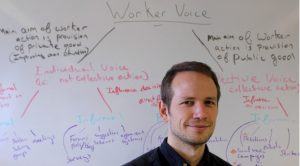After three years and nine months, I’m leaving the Oxford Internet Institute (OII) at the end of the month to take up a Lectureship in the Sociology Work at Birmingham University. I’ll be joining a highly regarded group of researchers in the ‘Organisation, Work and Employment Group’ at the Department of Management.

I joined the OII as a Researcher in November 2015 to work on the Microwork and Virtual Production Networks (MVPN) project. This project was one of the first major attempts to investigate the impact of the growing gig economy on workers in lower- and middle-income countries. My time working with Professors Mark Graham and Vili Lehdonvirta and Dr Isis Hjorth proved highly productive, with us publishing three articles in leading journals such as Sociology and Work, Employment and Society. During this time at the OII I also published three articles from my PhD research, including in leading journals Human Relations and Work, Employment and Society. Additionally, ‘Despotism on Demand: How Power Operates in the Flexible Workplace’ – a book based on my thesis – was accepted for publication by Cornell University Press earlier this year.
Following the completion of the MVPN project in 2016, I joined the OII’s iLabour project led by Vili Lehdonvirta, with my research investigating the existence of online labour movements in the gig economy. This research involved fieldwork in Manila, Los Angeles, San Francisco, New York and London as I conducted 70 semi-structured interviews with remote gig economy workers engaged in collective organisation and action and observed worker community events and meet ups. You can read our first working paper from the project, ‘Platform Labour and Structured Antagonism: Understanding the Origin of Protest in the Gig Economy’, here.
At Birmingham, I will continue collaborating with the members of the iLabour project (Professor Vili Lehdonvirta, Dr Gretta Corporal and Dr Otto Kässi) as we seek to publish our cutting edge research on platform work in the remote gig economy. Beyond this, I intend to undertake future research into how the gig economy is impacting on class identity and whether platform workers feel that their interests are being represented by existing institutions such as political parties and unions.
The OII provided me with a uniquely stimulating environment at a crucial juncture in my career, making it the perfect platform from which to influence how the ‘future of work’ is understood both among academics and the wider public and I look forward to continuing a close relationship with the OII.